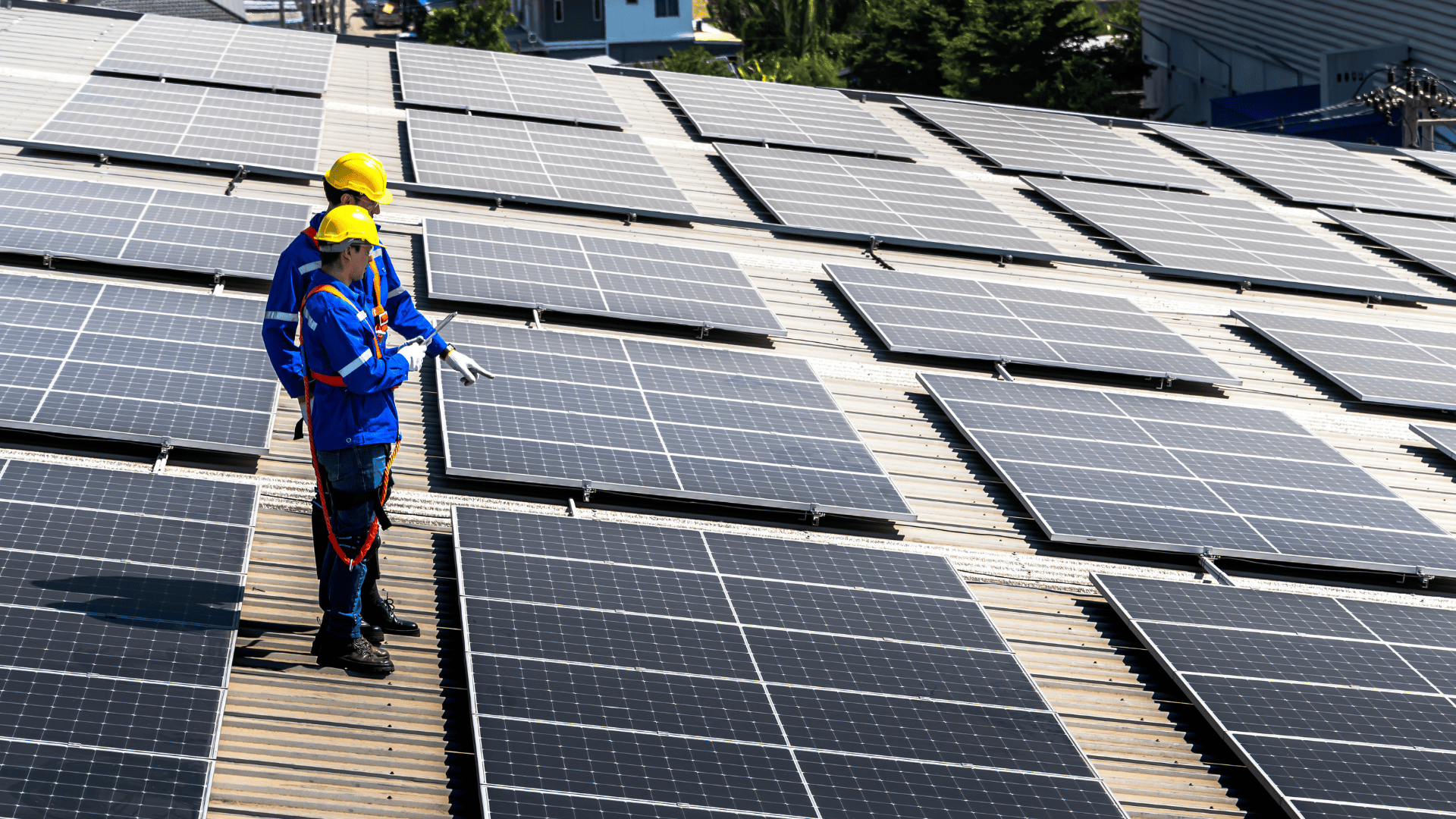July 3, 2023
As the world continues to shift towards sustainable energy sources, solar power has emerged as a popular and efficient alternative to traditional fossil fuels. In particular, residential solar panels have become increasingly popular as homeowners seek to reduce their carbon footprint and lower their energy bills.
However, not all solar panels are created equal, and homeowners looking to maximize their solar potential need to be aware of the top-performing residential solar panels on the market. In this blog post, we will explore the top-performing residential solar panels and provide tips for homeowners looking to get the most out of their solar installation.
Importance of Solar Energy in the Residential
Clean and Renewable Energy:
- Solar energy is a clean and renewable energy source, making it an environmentally friendly option for homeowners.
- It does not produce harmful emissions, helping to reduce the carbon footprint of households.
- Solar technology plays a vital role in promoting sustainability and contributing to a more sustainable future.
Cost Savings:
- By harnessing solar energy, homeowners can save money on their energy bills.
- Generating their electricity allows homeowners to reduce their reliance on the traditional power grid.
- Lowering reliance on the grid leads to decreased monthly energy costs.
- Over the past 10 years, the efficiency rates of solar panels have improved, as reported by the National Renewable Energy Laboratory (NREL).
- This improvement translates to higher energy generation and increased cost savings for homeowners.
Increased Home Value:
- Homes equipped with solar panels tend to have higher value and sell faster than homes without solar panels, according to various studies.
- Solar installations are seen as desirable features by potential buyers.
- The added value provided by solar panels can be particularly advantageous for homeowners planning to sell their homes in the future.
Types of solar panels
When choosing a solar panel, it is important to consider factors such as efficiency, cost, and lifespan to determine which type of solar panel is best suited to your needs.
There are three main types of solar panels available on the market today:
Monocrystalline solar panels
These solar panels are made from single-crystal silicon and are the most efficient type of solar panel available. They have a uniform dark color and are easily recognizable by their rounded edges. Monocrystalline solar panels tend to be more expensive than other types of solar panels, but they are also the most efficient solar panels and have the longest lifespan.
Polycrystalline solar panels
These solar panels are made from multiple silicon crystals and are less efficient than monocrystalline panels. They have a blue color and a square shape with sharp edges. Polycrystalline solar panels tend to be less expensive than monocrystalline panels, but they also have a shorter lifespan and lower efficiency.
Thin-film solar panels
These solar cells and panels are made from thin layers of semiconductor materials that are deposited onto a substrate. They are the least efficient type of solar panel, but they are also the most flexible and lightweight. Thin-film solar panels are often used in portable solar chargers and other applications where flexibility is important.
Advantages and disadvantages
The best type of solar panel for a particular application will depend on the specific needs and budget of the homeowner. Monocrystalline panels are the most efficient but also the most expensive, while polycrystalline panels offer a balance of cost and efficiency. Thin-film panels are the cheapest but also the least efficient, with a shorter lifespan than other high-efficiency solar panels used.
Advantages and disadvantages of different types of solar panels are:
Monocrystalline solar panels
Advantages
- Highest solar panel efficiency among all (15-20%)
- The long lifespan of 25-30 years
- Smaller size and higher power output per square foot compared to other panels
Disadvantages
- Expensive compared to other solar panel types
- Performance can be affected by high temperatures
- The production process requires more energy, which can increase the carbon footprint
Polycrystalline solar panels
Advantages
- Lower cost compared to monocrystalline panels
- Good efficiency (13-16%)
- Less affected by high temperatures compared to monocrystalline panels
Disadvantages
- Less efficient compared to monocrystalline panels
- Larger size and lower power output per square foot compared to other panels
- Shorter lifespan compared to monocrystalline panels
Thin-film solar panels
Advantages
- Cheapest solar cell and panel type
- Lightweight and flexible, it can be installed in various applications
- Better performance in low light conditions compared to other solar panels
Disadvantages
- Lowest efficiency among all solar panel types (7-13%)
- Shorter lifespan compared to other solar panel types (10-15 years)
- Larger size and lower power output per square foot compared to other panels
Factors to consider when choosing the most efficient solar panel for residential use
When choosing the most efficient solar panel for residential use, there are several factors that homeowners should consider. By considering these factors, homeowners can choose the most efficient solar panel system for their needs, budget, and location.
Durability
The efficiency of a solar panel refers to the amount of sunlight it can convert into electricity. Homeowners should choose solar panels with a high-efficiency rating to maximize the amount of energy they can generate.
Monocrystalline solar panels tend to be the most efficient, with an average efficiency rating of up to 20%, followed by polycrystalline panels, with an efficiency rating of up to 16%.
Cost
The cost of a solar panel system is an important consideration for many homeowners. While monocrystalline solar panels are the most efficient, they are also the most expensive.
Polycrystalline solar panels are a more cost-effective option, while thin-film solar panels are the cheapest but also the least efficient.
Efficiency
Solar panels are designed to last for several decades, so homeowners should choose panels that are durable and can withstand harsh weather conditions. Monocrystalline and polycrystalline solar panels are both durable and can last for up to 25-30 years, while thin-film solar panels have a shorter lifespan of 10-15 years.
Warranty
The warranty offered by the manufacturer is an important consideration when choosing a solar system. Homeowners should choose panels with a warranty that covers defects and damage for the expected lifespan of the panels.
Availability
Homeowners should choose solar panels that are readily available in their area and can be easily installed by a professional. This can help ensure that the sun's energy system can be installed quickly and efficiently without any delays or additional costs.
Most efficient solar panel for residential use
The most efficient solar panel for residential use is currently the SunPower X-series. This panel has an efficiency rating of up to 22.8%, which is higher than most other panels on the market.
Explanation of the most efficient solar panel
The SunPower X-series panel uses a unique design that allows it to capture more sunlight and generate more electricity per square meter than other panels. It also has a high-temperature coefficient, which means it can perform better in hot climates.
Advantages
- High-efficiency panels: The SunPower X-series panel is one of the most efficient panels on the market, which means it can generate more electricity from the same amount of sunlight.
- Space-saving: Due to their high solar efficiency alone, fewer panels are needed to generate the same amount of electricity compared to less efficient panels. This can be especially beneficial for homeowners with limited roof space.
- High performance in low light conditions: The SunPower X-series panel performs well in low light conditions, such as on cloudy days or in the early morning or late afternoon.
Disadvantages
- Cost: The SunPower X-series panel is more expensive than many other panels on the market, which can make it less affordable for some homeowners.
- Availability: The SunPower X-series panel may not be as widely available as other panels, as it is only manufactured by one company.
- Durability: While SunPower X-series panels are known for their high efficiency and performance, some studies have suggested they may not be as durable as other panels on the market.
Cost and Affordability
The cost of the SunPower X-series panel is typically higher than other panels on the market. However, this is offset by its high-efficiency ratings and the potential for cost savings over time due to the amount of electricity it can generate.
The affordability of the panel will depend on factors such as the size of the system, installation costs, and available incentives or rebates.
Efficiency
The SunPower X-series panel has an efficiency rating of up to 22.8% because of its advanced solar cell technology, which is higher than most other panels on the market. This means it can generate more electricity from the same amount of sunlight, which can result in higher energy savings over time.
Durability and Warranty
The SunPower X-series panel comes with a 25-year warranty, which is longer than most other panel warranties. The panels are also designed to be durable and weather-resistant, with high-quality construction and a strong frame. However, some studies have suggested that they may not be as durable as other panels on the market.
Availability
The SunPower X-series panel may not be as widely available as other panels, as it is only manufactured by one company. However, it is available through authorized dealers and other solar installers in many areas.
Installation process
Site survey
The first step is to conduct a site survey to determine the best location for solar panel installation and how many solar panels you need. Factors to consider include the angle and orientation of the roof, shading from nearby trees or buildings, and the electrical wiring of the building.
Design
Solar panel manufacturers publish solar panel data sheets detailing their dimensions, performance metrics, and internal chemistry. Based on the site survey, a design will be created for the solar panel system. This includes the number of panels needed, the type of panels, and the size of the inverter required.
Permitting
Before installation can begin, you may need to obtain permits from your local government or homeowner’s association.
Installation
The installation process typically involves mounting the solar panels on the roof or a ground mount, connecting the panels to the inverter, and wiring the inverter to the building’s electrical system.
Inspection
Once the installation is complete, the system will need to be inspected by a qualified electrician to ensure it meets all safety and performance standards.
Maintenance tips to get the most out of your residential solar panel system
Keep the panels clean
Dirt leaves and other debris can accumulate on solar panels and reduce their efficiency. Clean the panels regularly with a soft brush or sponge and water.
Monitor performance
Keep track of the amount of usable electricity that your system is generating, and be aware of any sudden drops in performance. This could indicate a problem with the system that needs to be addressed.
Check for damaged
Inspect the panels and mounting hardware regularly for signs of damage or wear and tear. If you notice any damage, contact a professional installer to repair or replace the damaged components.
Trim nearby trees
Trees or other vegetation that cast shade on the panels can reduce their efficiency. Trim nearby trees and shrubs to prevent shading.
Schedule regular maintenance
It’s a good idea to have a professional installer perform regular maintenance on your solar panel system to ensure it is functioning at its best. They can also inspect the wiring, connections, and other components to catch any potential issues before they become a problem.
About Sunbase All-in-one Solar Software
Are you ready to take your solar business to soaring heights? Look no further than Sunbase - the ultimate solution that empowers solar professionals. With its comprehensive suite of advanced features and unmatched functionality, Sunbase revolutionizes the way you manage, design, and grow your solar projects. Say goodbye to tedious manual processes and embrace a new era of efficiency, productivity, and profitability.
From seamless customer relationship management to precise PV system design, from captivating proposal generation to streamlined project management, Sunbase has it all. Our software is meticulously crafted to address the specific needs of the solar industry, giving you the competitive edge you deserve. Experience the thrill of unlocking your true potential and watch your solar business thrive like never before. Get more information about Sunbase all-in-one software here!
Conclusion
In conclusion, installing solar panels in your home is an excellent way to save money on energy bills, reduce your carbon footprint, and increase your home's value. Choosing the right solar panel is crucial to maximize the potential of your solar system.
The SunPower X-series is currently the most efficient panel available for residential use, with a high-performance rating, durability, and a lengthy warranty period. However, it may not be the most affordable option for some homeowners, and availability may vary.
It's essential to consider your budget, energy needs, and geographical location when selecting a solar panel to ensure you get the most out of your investment. With careful planning, maintenance, and monitoring, your solar system can provide reliable and renewable clean energy for years to come.
I agree to receive marketing messaging from Sunbase at the phone number provided above. I understand data rates will apply, and can reply STOP to OPT OUT.







